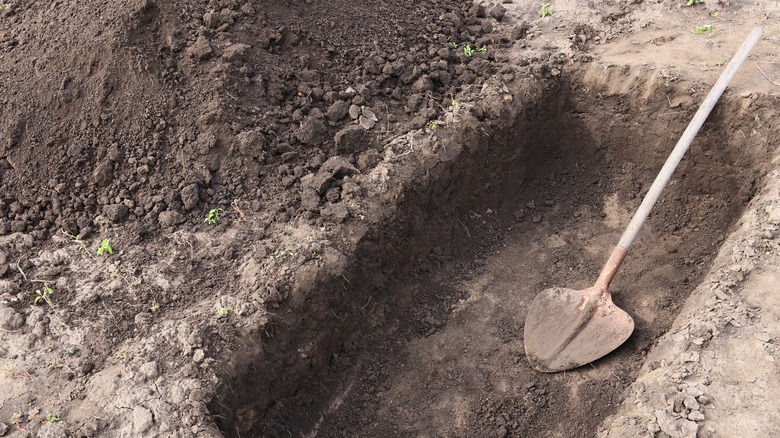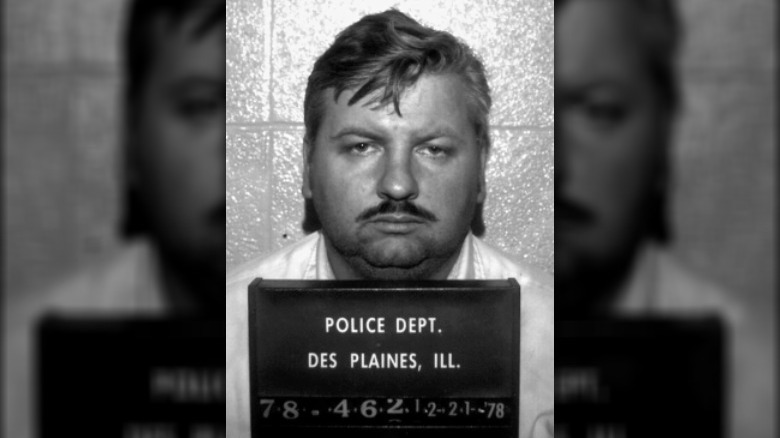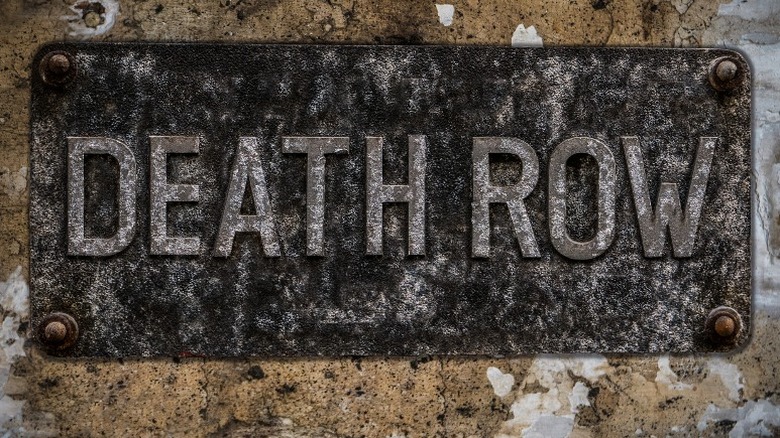Who Was The Man Who Unknowingly Dug The Graves Of John Wayne Gacy's Victims?
David Cram was hitchhiking around Chicago in 1976 when he was picked up by a man who would later be revealed as one of the country's most brutal serial murderers. John Wayne Gacy, who would later be convicted of killing 33 young men and boys, would routinely cruise the bus stops, train stations, and highways as a way to locate potential prey (per Biography). His successful contracting business, PDM (Painting, Decorating, & Maintenance) was the perfect lure for wayward teens and young men who were physically fit (and hungry enough) for labor. Cram took the job and lived to tell of his experiences.
Cram's association with Gacy could have left him another one of his many murder victims. It would be revealed that Cram managed to fend off two separate sexual assaults from Gacy, as well as becoming an unwitting accomplice to murder. Gacy needed help digging holes in his crawlspace, a job that Cram was duped into taking shortly after being hired.
It's difficult to imagine the feelings Cram experienced when he first heard the news of Gacy's arrest, especially when it was discovered that multiple bodies were unearthed from the very trenches dug by the one-time employee and roommate. Whatever emotions he was experiencing, he didn't let that stop him from giving some pretty damning testimony against Gacy in court.
If you or anyone you know has been a victim of sexual assault, help is available. Visit the Rape, Abuse & Incest National Network website or contact RAINN's National Helpline at 1-800-656-HOPE (4673).
Gacy threatened Cram with rape at least twice
Cram was one of several young men that Gacy recruited to work for his contracting business. In July 1976, the 18-year-old began a short stint as Gacy's employee and moved into Gacy's house at 8213 W. Summerdale Avenue. His stay in the Killer Clown's house was a short-lived one, however (per Newsweek).
During Gacy's murder trial, Cram was put on the stand to testify against his former employer and roommate. The Montreal Gazette reports that his testimony revealed chilling details about his brief time under Gacy's roof. Cram recalled two instances where Gacy threatened to sexually assault the teen, the first occasion occurring on Cram's birthday. He testified under oath that he arrived at Gacy's house that night to find Gacy dressed in his clown suit. "He said he wanted to show me the handcuff trick," Cram stated. After allowing Gacy to handcuff him with his hands in front, Cram realized that the "trick" was needing the key.
Cram recalled how Gacy grabbed the chain of the handcuffs and swung him around, telling him "I'm going to rape you." After a struggle, Cram landed a swift kick to Gacy's head, knocking his captor down. Cram retrieved the key from Gacy and freed himself.
Another incident happened a month later when Cram was in his bed. Gacy appeared in the room and jumped on him. During their brief conflict, Cram's pants were ripped. But Gacy gave up, leaving the room with the parting words: "You're no fun."
Cram soon moved out.
If you or anyone you know has been a victim of sexual assault, help is available. Visit the Rape, Abuse & Incest National Network website or contact RAINN's National Helpline at 1-800-656-HOPE (4673).
One of Cram's jobs was to dig trenches under Gacy's house
Cram continued his testimony to the court, answering questions about his activity in the crawlspace beneath Gacy's home. Cram revealed that he continued to work sporadically for Gacy after he moved out, despite the two sexual assault attempts he had endured. According to The Montreal Gazette, Cram arrived at Gacy's house in August 1977 thinking he would be working in the garage. When he arrived, Gacy gave him other instructions.
A plumber would be coming in to lay more piping under the house, Gacy told Cram. He wanted Cram to enter the crawlspace under the house and dig trenches for it. Cram dropped through a trap door that led under the house and got to work. In the 30" high space, Cram testified that he noticed mounds of dirt in the part of the space that he wasn't digging. Cram dug two trenches, one eight feet long and another three feet long. Both were approximately two feet across and knee-deep. Both would later host the bodies of Gacy's future murder victims.
Noting that there was a foul odor coming from the area, Gacy also instructed Cram to scatter lime throughout the crawlspace "to sweeten the smell."
If you or anyone you know has been a victim of sexual assault, help is available. Visit the Rape, Abuse & Incest National Network website or contact RAINN's National Helpline at 1-800-656-HOPE (4673).
Cram discussed his relationship with Gacy publicly after the trial
Cram's testimony in court would not be the last time he would publicly speak about his experiences with Gacy. On an episode of "Biography" in 1999, he recalled the horrific details of nearly being sexually assaulted by Gacy (via IMDb). He was also featured posthumously in the 2012 documentary "Serious Serial Killers."
Sadly, Cram died by suicide in 2001. His body was found hanging in the Cook County Forest preserves in Chicago. The Chicago Tribune reports that police found multiple empty beer bottles near his body, along with folders containing information about alcohol addiction.
It's been speculated that Cram and another former Gacy employee, Michael Rossi, had a helping hand in several of the murders, if not committing them outright on their own. CBS News reports that two Chicago attorneys came forward in 2012 and concluded that, after examining the available evidence, Gacy did not act alone. There was never enough solid evidence to charge anyone else with murder or accessory to murder, however. To date, Gacy is the only person who has been legally recognized as the killer of the 26 young men and boys found beneath his Chicago home.
Gacy was executed by lethal injection on May 10, 1994 (per ABC News).
If you or anyone you know needs help with addiction issues, help is available. Visit the Substance Abuse and Mental Health Services Administration website or contact SAMHSA's National Helpline at 1-800-662-HELP (4357).



